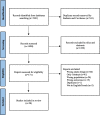Interventions to promote healthy lifestyle behaviors in children and adolescents in summer day camps: a scoping review
- PMID: 37101170
- PMCID: PMC10134537
- DOI: 10.1186/s12889-023-15521-1
Interventions to promote healthy lifestyle behaviors in children and adolescents in summer day camps: a scoping review
Abstract
Background: Children and adolescents have suboptimal physical activity and eating habits during summer breaks. Unlike the school setting, there is little evidence on interventions to promote healthy lifestyle behaviors in Summer Day Camps (SDCs).
Methods: The aim of this scoping review was to examine physical activity, healthy eating, and sedentary behavior interventions in the SDCs. A systematic search on four platforms (EBSCOhost, MEDLINE, EMBASE, and Web of Science) was performed in May 2021 and was updated in June 2022. Studies related to promoting healthy behaviors, physical activity, sedentary behaviors and/or healthy eating among campers aged 6 to 16 in Summer Day Camps were retained. The protocol and writing of the scoping review were done according to the guidelines of the "Preferred Reporting Items for Systematic reviews and Meta-Analyses extension for scoping reviews (PRISMA-ScR)".
Results: Most interventions had a positive effect on the behavioral determinants or the behaviors themselves (i.e., physical activity, sedentary behaviors, or healthy eating). Involving counsellors and parents, setting camp goals, gardening, and education are all relevant strategies in promoting healthy lifestyle behaviors in SDCs.
Conclusions: Since only one intervention directly targeted sedentary behaviors, it should strongly be considered for inclusion in future studies. In addition, more long-term and experimental studies are needed to establish cause-and-effect relationships between healthy behavior interventions in SDCs and behaviors of children and young adolescents.
Keywords: Adolescents; Children; Healthy eating; Healthy lifestyle behaviors; Physical activity; Sedentary behaviors; Summer Day Camps.
© 2023. The Author(s).
Conflict of interest statement
The authors declare that they have no competing interests.
Figures
Similar articles
-
Evaluation of the Power Up program: a health promotion program encouraging healthy lifestyle habits among youth in summer day camps-study protocol.Front Public Health. 2025 Feb 26;13:1521438. doi: 10.3389/fpubh.2025.1521438. eCollection 2025. Front Public Health. 2025. PMID: 40078763 Free PMC article.
-
Residential summer camp: a new venue for nutrition education and physical activity promotion.Int J Behav Nutr Phys Act. 2013 May 24;10:64. doi: 10.1186/1479-5868-10-64. Int J Behav Nutr Phys Act. 2013. PMID: 23705879 Free PMC article.
-
First year physical activity findings from turn up the HEAT (Healthy Eating and Activity Time) in summer day camps.PLoS One. 2017 Mar 28;12(3):e0173791. doi: 10.1371/journal.pone.0173791. eCollection 2017. PLoS One. 2017. PMID: 28350830 Free PMC article. Clinical Trial.
-
Use of latent class analysis as a method of assessing the physical activity level, sedentary behavior and nutritional habit in the adolescents' lifestyle: A scoping review.PLoS One. 2021 Aug 19;16(8):e0256069. doi: 10.1371/journal.pone.0256069. eCollection 2021. PLoS One. 2021. PMID: 34411143 Free PMC article.
-
Caregiver involvement in interventions for improving children's dietary intake and physical activity behaviors.Cochrane Database Syst Rev. 2020 Jan 5;1(1):CD012547. doi: 10.1002/14651858.CD012547.pub2. Cochrane Database Syst Rev. 2020. PMID: 31902132 Free PMC article.
Cited by
-
Differences in Children's Food and Beverage Consumption between School and Summer: Three-year findings from the What's UP (Undermining Prevention) with Summer Observational Cohort Study.Res Sq [Preprint]. 2025 May 7:rs.3.rs-6255625. doi: 10.21203/rs.3.rs-6255625/v1. Res Sq. 2025. Update in: BMC Public Health. 2025 Jul 10;25(1):2431. doi: 10.1186/s12889-025-23446-0. PMID: 40386406 Free PMC article. Updated. Preprint.
-
Evaluation of the Power Up program: a health promotion program encouraging healthy lifestyle habits among youth in summer day camps-study protocol.Front Public Health. 2025 Feb 26;13:1521438. doi: 10.3389/fpubh.2025.1521438. eCollection 2025. Front Public Health. 2025. PMID: 40078763 Free PMC article.
-
Enhancing nutritional knowledge and self-regulation among adolescents: efficacy of a multifaceted food literacy intervention.Front Psychol. 2024 Sep 13;15:1405414. doi: 10.3389/fpsyg.2024.1405414. eCollection 2024. Front Psychol. 2024. PMID: 39346502 Free PMC article.
-
Health effects of children's summer holiday programs: a systematic review and meta-analysis.Int J Behav Nutr Phys Act. 2024 Oct 18;21(1):119. doi: 10.1186/s12966-024-01658-8. Int J Behav Nutr Phys Act. 2024. PMID: 39425115 Free PMC article.
-
Differences in children's food and beverage consumption between school and summer: three-year findings from the what's UP (Undermining Prevention) with summer observational cohort study.BMC Public Health. 2025 Jul 10;25(1):2431. doi: 10.1186/s12889-025-23446-0. BMC Public Health. 2025. PMID: 40640735 Free PMC article.
References
-
- Craig WM, King M, Pickett W. The Health of Canadian Youth: Findings from the Health Behaviour in School-aged Children Study. 2020.
Publication types
MeSH terms
LinkOut - more resources
Full Text Sources
Medical


